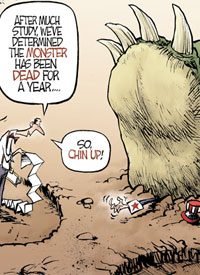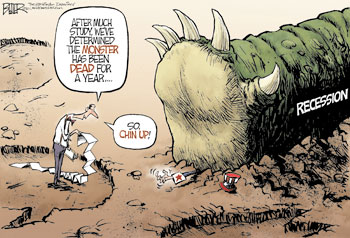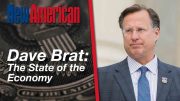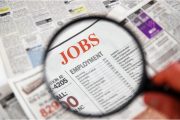
On September 22, the Business Cycle Dating Committee of the National Bureau of Economic Research (BCDC-NBER) announced that the recession (it began in December 2007) had ended in June 2009. Obviously, all of those out-of-work Americans clogging the unemployment lines and lining up at job fairs didn’t get the good news.
The announcement brought to mind the old wisecrack: “If you lined up all the economists in the world — that would be fine!” Of course there are some economists worth listening to, such as Stephen Gjerstad and Vernon L. Smith of California’s Chapman University. They claim that the economy has not turned around and that one indicator of this is the fact that robust home building has not started up again. Because they don’t see that happening, they conclude, “We are almost surely in for a long slog.”
How bad is the housing market? Gjerstad and Smith note that foreclosures are as high as they’ve ever been. Mortgage watchers at the research analytics firm Core-Logic claim that 23 percent of mortgage holders are in a condition called “negative equity.” In other words, they are “under water,” the term aptly describing the condition of homeowners who owe more on their homes than they’re worth. Total negative equity of the underwater population exceeds $750 billion. Many of the foreclosures and much of the negative-equity problem are a result of the Fed’s easy-money policies and artificially low interest rates that encouraged risky loans and living beyond one’s means. Robust building should not again occur until debt is reduced and savings are accumulated, and the lack of building indicates that this correction has not yet taken place.
So, who are the gurus who decided that the worst was over 16 months ago? And how did they arrive at their conclusion?
Let’s tackle the first question. The seven-member group is chaired by Stanford University’s Robert Hall. Harvard supplied Martin Feldstein, Jeffrey Frankel, and James Stock. MIT’s James Poterba, Princeton’s Mark Watson, and Northwestern’s Robert Gordon hold the other places on this panel. An eighth member, UCAL Berkeley’s David Romer, is currently on leave.
The seven active BCDC-NBERers met via conference call on September 21 and promptly issued their pronouncement. They concluded that there had been a “trough” in business activity in June 2009, a phenomenon they describe as the bottom of a bad period. A slight uptick from a deep hole, the “trough,” signified to them that the recession has ended. Any reversal of that upward swing would be a new recession, not a continuation of the old one. Got it? If the hole you find yourself in is 12 feet deep and someone pours in a shovel full of dirt so that now you’re only 11.8 feet down, you can’t call your predicament by its previous name. No longer as deep a hole, you’re in an improving situation, and the best you can do is hope that several dozen good Samaritans will pour in several dozen more shovels of dirt. But it’s obvious that anyone unemployed and searching for a way to pay bills and feed a family cares a lot less about troughs than about getting a job and exiting the hole.
 On the very day that BCDC-NBER announced its mysterious finding, member James Poterba backed down a bit and offered, “We started from a deep hole. And clearly the bounceback has not been immediate after hitting this trough.” He had to admit that joblessness remains a problem and gross domestic product figures show a decline, not any rise. Then, the Census Bureau released findings showing that American families at all income levels except the very wealthy had lower earnings throughout 2009 in previous years. The only sensible conclusion is that the “slog” persists.
On the very day that BCDC-NBER announced its mysterious finding, member James Poterba backed down a bit and offered, “We started from a deep hole. And clearly the bounceback has not been immediate after hitting this trough.” He had to admit that joblessness remains a problem and gross domestic product figures show a decline, not any rise. Then, the Census Bureau released findings showing that American families at all income levels except the very wealthy had lower earnings throughout 2009 in previous years. The only sensible conclusion is that the “slog” persists.
In their new book, The Coming Generational Storm: What You Need to Know About America’s Economic Future, Laurence Kotlikoff and Andrew Moylan bluntly state that the government is lying about the national debt and that federal spending has exploded. These are fundamental contributors to economic decline. The government’s claim of $13.4 trillion indebtedness, say these two realists, is gross misinformation because the reality is that the national debt sits somewhere between $60-200 trillion.
How to combat America’s problems? Stop doing what we’ve been doing. Thomas Sowell, an economist and political commentator, says everything the government did wrong in the past is being repeated and escalated. Case in point: “The recent so-called financial reform act left out Fannie Mae and Freddie Mac,” two institutions that brought on the housing bubble and led the way into recession. In an interview appearing in Investor’s Business Daily, Sowell adds: “People ask me sometimes why politicians continue to make the same mistakes. Don’t they ever learn? And I reply, ‘They do learn! They learn that they can get away with it. That’s what they learn.’”
If the recession is really going to end, it will start with wholesale reductions in government programs prompted by a wholesale change in the makeup of Congress. That happy condition starts with an aware electorate. Too much government is killing the American goose that has always laid golden eggs. Much less government will initiate a really meaningful boost from the “trough” that will be more than a minuscule uptick.



